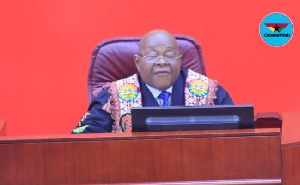The Speaker of Parliament, Prof. Aaron Mike Ocquaye, says parliament needs space to finish off work on the “tricky” Right to Information (RTI) Bill.
According to him, work on the bill is near completion and will come off by February 2019.
Prof. Ocquaye in his closing remarks of the 3rd meeting of the 7th Parliament Saturday night said: “While parliament is working hard to pass the Right of Information bill, certain persons and institutions are acting as if we are drooling off on the bill. This is fallacious and I will be glad if the media will seriously correct this impression. The bill has seen several years and several parliaments, and it is tricky in many ways. The budget and other important matters came on the way. We have done 80% of the work already, we will finish the bill fully, I believe, and professionally on or before the end of February 2019.
He added: “The public should please trust us and leave us alone for now to do a good job. We are committed to passing the bill and we are working towards it. No civil society group should, at this belated hour, jump on our backs and pretend as if they are the people interested in the passage of this bill. ”
About the RTI Bill
The Right to Information Bill is meant to ensure citizens of this country have access to official information from Public Offices on request and without request.
The RTI is implicit in the notion that the Ghanaian taxpayers need to have access to the Information concerning what Government does with their money and what government plans to do on their behalf.
The Bill is meant to put in effect Article 21(1) (f) of the 1992 constitution of the Republic of Ghana which states that “All persons shall have the right to Information subject to such qualifications and laws as are necessary in a democratic society.
The bill was first drafted in 1999 and reviewed in 2003. It also spells out the establishment of the right to information commission to ensure independence of the review process.
General News of Sunday, 23 December 2018
Source: kasapafmonline.com













